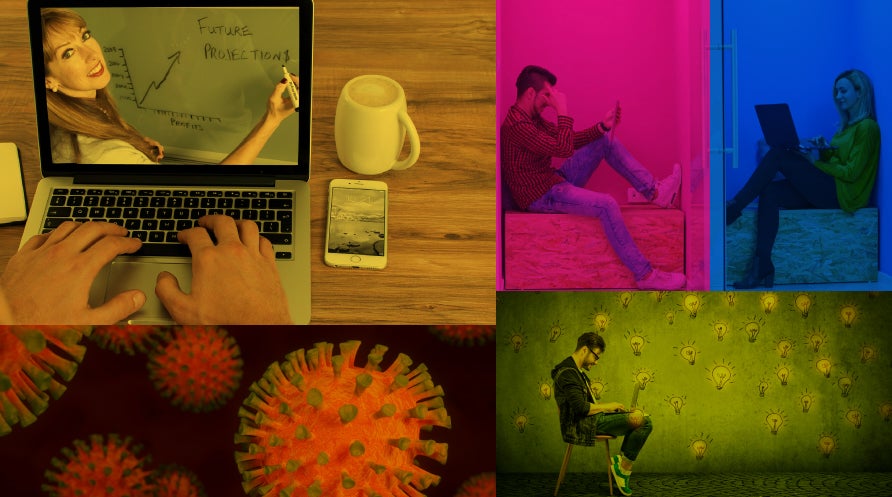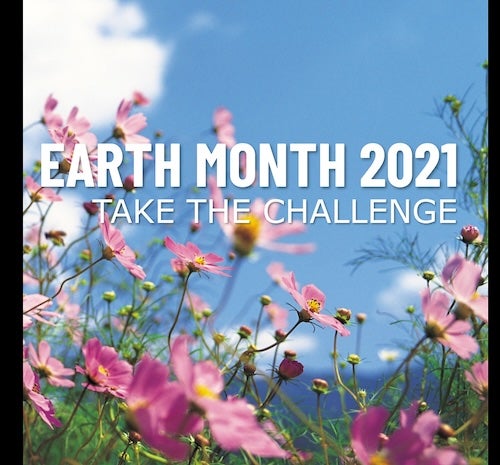Editor:
Brandon Sweet
University Communications
bulletin@uwaterloo.ca
Concept $5K winners announced

This piece was adapted from an article published on the Concept website.
The spring sun is melting the winter snow away, but UWaterloo students were the ones shining brightest at the Concept $5K Finals. This term marked our return to a live Finals event, virtually of course, and the student teams stepped up to put on an impressive and entertaining show. Our finalists faced the toughest path to victory yet as we saw over 120 different ideas submitted for consideration.
Even as labs across campus are closed or severely limited, teams are dispersed across the world, and a pandemic looming over everything, these entrepreneurial students focused on their innovations and continued to develop new ideas. A huge kudos to everyone who applied this semester and pitched at the Semi-Finals or the Finals. Your dedication is highly admirable and stands as a testament to both your character and commitment to creating solutions.
The bar is continually rising for what it takes to win our staple pitch competition, and this semester was no exception. The Finalists for the Winter 2021 Concept $5K Finals were covering a wide range of industries and solving important problems that thoroughly impressed our judges.
We would like to extend a massive thank you to everyone on our judging panel for taking the time to come out and help support student entrepreneurship. Their questions and feedback were invaluable for the teams and will enable them to look deeper into their ideas and better refine them for future success. Thank you to John Cappuccitti, Keyma Prince, and Julia Fung for providing their expertise and helping to split hairs between Finalists and Winners. Although each team made their decision difficult, a few pitches and ideas stood out above the rest.
This term's winners are:
- AquaSensing, which designs battery-free water leak detection systems that reduce environmental footprint, upfront costs, and recurring maintenance requirements.
-
Arbitrium, a digital end-to-end decision making platform that allows organizations to easily make unbiased group decisions involving multiple stakeholders.
-
Scribenote, which eliminates hours of costly, taxing work for doctors, nurses and veterinarians by automating medical documentation.
-
UWTensil, which has developed a novel material to be manufactured into cheap, biodegradable cutlery (and other food distribution applications), serving as a viable replacement for disposable cutlery when the Canadian ban on single-use plastics is implemented.
The Winning Continues
A huge congratulations to all these impressive as they join an illustrious group of previous Concept $5K Winners who continue to develop their ideas and make UWaterloo proud. Although the $5K grants have been named, the competition isn’t over yet: voting is open until April 1 to help decide the People’s Champ who will receive $500 and the knowledge that their idea is loved by the community. To vote, check out the Finals pitches on YouTube and like the video of your favourite team. We will announce the winner over social media on April 1 so be sure to follow us and stay tuned.
As another term draws to a close, the University of Waterloo community has once again displayed a passion for innovation and a dedication to creating solutions. We commend everyone involved and look forward to seeing all these teams (Finalists, Semi-Finalists, and applicants) continue to develop their ideas and build awesome startups at UWaterloo. To stay in the know about other exciting opportunities and to see how these teams progress follow us on social media and sign up for our newsletter for your weekly dose of Concept news.
Read the full blog post and see videos from the winning teams
New study advances scientific understanding of Solar Geoengineering
This article originally appeared on the Interdisciplinary Centre on Climate Change website.

A University of Waterloo researcher is part of an interdisciplinary committee that released a new report entitled “Reflecting Sunlight: Recommendations for Solar Geoengineering Research and Research Governance.”
Waterloo’s Juan Moreno-Cruz is a member of the National Academies of Sciences, Engineering, and Medicine (NASEM) committee who developed the report on Solar Geoengineering (SG). Juan is a Professor in the School of Environment, Enterprise and Development and a member of Waterloo’s Interdisciplinary Centre on Climate Change (IC3).
The report examines the current understanding of the potential risks and benefits of three proposed SG strategies and makes recommendations for how to establish a research program, a research agenda, and mechanisms for governing this research.

The NASEM committee was asked to develop a research agenda to advance the scientific understanding of SG and recommend how SG research should be governed. The committee focused on three particular SG strategies--Stratospheric Aerosol Injection (SAI), Marine Cloud Brightening (MCB), Cirrus Cloud Thinning (CCT). The committee was comprised of interdisciplinary experts, as is evident in the resulting research agenda.
“Solar Geoengineering technologies are viewed by some as a potential strategy to reduce surface temperatures and potentially ameliorate some risks posed by climate change” explains Juan. “But these strategies are controversial within and beyond the climate science community. There is a lot we don’t know about it yet. This report is a step towards a US research program for solar geoengineering to help us understand its potential for cooling earth and reducing some of the risks of climate change—and to understand any potential harmful impacts of these technologies on society and the environment.”
This study will support the development of a research agenda and research governance approaches for climate intervention strategies that reflect sunlight to cool Earth. This work will also help to inform research governance mechanisms at international, national, and sub-national scales.
“A research program for solar geoengineering that’s designed well is just as likely to lead us to abandoning this option as a climate change strategy as it is to lead to us considering deploying it” says Juan. “As research moves forward, nations should work together to set international norms and governance for these technologies. Canada can lead on this international effort, but research is a precondition for Canada to be an active participant in determining these international governance structures. We have the talent and the expertise and the responsibility to guide this research.”
For more information on the report and project please visit the National Academies of Sciences, Engineering, and Medicine website.
Earth Month Challenge begins; other notes

The Sustainability Office has launched the Earth Month 2021 challenge, happening from Monday, March 29 to Friday, April 23. "This four-week challenge will encourage you to take action on four different weekly themes: sustainable food, waste reduction, connecting with nature, and promoting wellness," says a note from the Sustainability Office. Here’s how you can participate:
- Register for the challenge to stay in the loop
- Take action each week from a list of five themed actions
- Track your impact through the weekly reporting form
- Get rewarded by contributing to collective impact and being entered into the grand prize draw
For more information and to register, please visit the Earth Month 2021 challenge webpage and keep tabs on social media using the hashtag #EarthMonthUW.
Members of the University community are invited to find out more about key updates to Policy 42: the Sexual Violence Prevention and Response Policy and Procedures, the process for making a complaint, as well as your roles and responsibilities as a university employee when someone has been impacted by sexual violence, in a workshop entitled Policy 42 and You. The workshop will be held Tuesday, March 30, from 1:00 p.m. to 2:00 p.m.
Today is the last day to register for Employee Wellness Session: Decoding Nutrition Claims and Nutrition Labels. The wellness session, offered by Registered Dietitian Nicole Pin takes place on Tuesday, March 30, from 1:30 p.m. to 2:30 p.m.
Registration is also open for the following Employee Wellness Sessions, offered by Homewood Health and the Employee and Family Assistance Plan:
- COVID-19 – Calming Your Mind During these Challenging Times, Wednesday, April 7, 1:00 p.m. to 2:00 p.m.
- Beyond Stigma – Increasing Our Understanding of Mental Health in the Workplace, Friday, April 9, 1:00 p.m. to 2:00 p.m.
Registration dates for both of the sessions are Monday, March 29 to end of day Monday, April 5.
Here's the latest Nutrition Month Myth vs. Fact supplied by Health Services Dietitian Sandra Ace:
Myth: The Internet is a good place to find reliable nutrition advice.
Fact: Much of the nutrition information online is not based on scientific evidence.
Consumers seeking health-information have a good reason to be skeptical. Anyone can have a website, write a blog, sell a product or author a book. Someone who doesn’t have the proper credentials has the potential to waste your time, money or, even worse, may give recommendations that are detrimental to your health. Some individuals may even appear to be qualified, however just because they have initials after their name doesn’t mean they have training that qualifies them to provide accurate, evidence-supported nutrition recommendations.
Familiarize yourself with guidelines that can help you accurately evaluate web-based health information. Don’t turn to the Internet when you are making important health decisions. Instead, speak with a trusted and qualified healthcare professional. If you are searching for information on a particular health topic, look for websites from sources such as government and public health websites, educational institutions, and disease-specific, non-profit advocacy, research and education organizations like the Canadian Cancer Society. For starters, you can find some reliable nutrition-related websites here.
Online info is not a substitute for personalized, expert nutrition guidance. Many extended health insurance programs, including the plan which covers eligible University of Waterloo employees, provide benefits for paramedical services including Registered Dietitians. A dietitian must fulfill rigourous educational and other requirements which make them uniquely qualified professionals. Registered Dietitians practicing in Ontario are licensed and regulated by the College of Dietitians of Ontario, use the initials “RD” after their name and can be found on this public registry. Telehealth Ontario also provides free access to a Registered Dietitian for Ontario residents who call with a food or nutrition question.
Link of the day
When and Where to get support
Students can visit the Student Success Office online for supports including academic development, international student resources, leadership development, exchange and study abroad, and opportunities to get involved.
Instructors can visit the Keep Learning website to get support on adapting their teaching and learning plans for an online environment.
Updated Course templates are now available within your course in LEARN to help you build and edit your content and assignment pages quickly.
The following workshops, webinars, and events are offered by the KL team (CTE, CEL, ITMS, LIB):
Independent Remote Course Design Essentials. Self-directed, continuous self-enrollment course in LEARN.
Integrative and Experiential Learning Session (CTE7700), Wednesday, March 31, 2:00 p.m. to 3:30 p.m.
Introduction to PebblePlus (CTE7527), Wednesday, April 7, 1:00 p.m. to 3:00 p.m.
Employees can access resources to help them work remotely, including managing University records and privacy of personal information. Here are some tips for staying healthy while working from home.
Stay informed about COVID cases on campus by consulting the COVID case tracker.
Whether you’re a student or faculty member, the Writing and Communication Centrehas virtual services and programs to help you with all of your academic writing needs. This term we have added evening and weekend one-to-one appointments with our peer tutors, and our NEW one-to-one workshops, where you can learn the content directly from one of our writing advisors.
- Undergraduates: Work with us to brainstorm, draft, revise, and polish your assignments in one-to-one appointments. Ask questions and learn writing tips at our Instagram Live Q&A sessions, and beat isolation while improving your writing skills at the weekly PJ-friendly writing groups.
- Graduates: Meet with our advisors in one-to-one appointments. Join the online writing community at the Virtual Writing Cafés, learn how to present your work at Speak Like a Scholar, or get moving on your dissertation at Dissertation Boot Camp.
- Faculty and Instructors: Request custom workshops for your courses, join the Waterloo writing community at the Virtual Writing Cafés, or make progress on your article, book, or chapter in one-to-one meetings with our faculty specialist.
Co-op students can get help finding a job and find supports to successfully work remotely, develop new skills, access wellness and career information, and contact a co-op or career advisor.
The Centre for Career Action assists undergraduates, graduate students, postdocs, staff, faculty, and alumni through navigating career services that are right for them. You can attend a one-on-one appointment or same day drop-in session at the CCA for assistance with cover letter writing, career planning and much more. You can also book an appointment online or visit our Live Chat to connect with our Client Support Team. The CCA is here to help you.
If you feel overwhelmed or anxious and need to talk to somebody, please contact the University’s Campus Wellness services, either Health Services or Counselling Services. You can also contact the University's Centre for Mental Health Research and Treatment. Good2Talk is a post-secondary student helpline available to all students.
The Library has published a resource guide on how to avoid information overload.
The Faculty Association of the University of Waterloo (FAUW) continues to advocate for its members. Check out the FAUW blog for more information.
The University of Waterloo Staff Association (UWSA) continues to advocate for its members. Check out the UWSA blog for more information.
The Indigenous Initiatives Office is a central hub that provides guidance, support, and resources to all Indigenous and non-Indigenous campus community members and oversees the university Indigenization strategy.
The Waterloo Indigenous Student Centre, based at St. Paul’s University College, provides support and resources for Indigenous students, and educational outreach programs for the broader community, including lectures, and events.
WUSA supports for students:
Peer support (Visit https://wusa.ca/peersupport to book an appointment):
- MATES – Available Monday to Friday, 10:30 a.m. to 9:30 p.m.; Saturday and Sunday, 10:30 a.m. to 5:30 p.m. (online only)
- Support sessions available in the following languages: Cantonese, English, Hindi, Mandarin, Portuguese, Punjabi, Spanish, and Urdu.
- Glow Centre – Available Monday to Friday, 4:00 p.m. to 8:00 p.m. (online only)
- RAISE – Available Monday to Friday – Varied hours (online only)
- Women’s Centre – Available Monday to Friday, 2:00 p.m. to 5:00 p.m. (online only)
Bike Centre – Will be reopening soon.
Campus Response Team, ICSN, Off Campus Community and Co-op Connection all available online. Check https://wusa.ca for more details.
Food Support Service food hampers are currently available from the Turnkey Desk on weekdays from 7:30 a.m. to 7:00 p.m. in the Student Life Centre. If you have any questions please email us at foodsupport@wusa.ca.
Centre for Academic Policy Support - CAPS is here to assist Waterloo undergraduates throughout their experience in navigating academic policy in the instances of filing petitions, grievances and appeals. Please contact them at caps@wusa.ca. More information is available.
WUSA Commissioners who can help in a variety of areas that students may be experiencing during this time:
- Equity – equity@wusa.ca
- Co-op and Experiential Affairs – coop.affairs@wusa.ca
WUSA Student Legal Protection Program- Seeking legal counsel can be intimidating, especially if it’s your first time facing a legal issue. The legal assistance helpline provides quick access to legal advice in any area of law, including criminal. Just call 1-833-202-4571.
Empower Me is a confidential mental health and wellness service that connects students with qualified counsellors 24/7. They can be reached at 1-833-628-5589.
When and Where (but mostly when)
Athletics & Recreation Facility Information (Red Control Zone)
In-Person Fitness Classes ($4/class)
Healthy Warriors at Home (Online Fitness)
Drop-in to Warrior Virtual Study Halls on Wednesdays from 5:30 p.m. to 7:00 p.m. Come together in this virtual space to set goals and work independently or in groups each week.
Livestream Exercises for Waterloo staff: Join us for an energy boosting Bootcamp or a fast and effective Express Home Workout! Open to UW Staff and subsidized by the Staff Excellence Fund.
Renison English Language Institute continues to offer virtual events and workshops to help students practice their English language skills.
Warriors vs. Laurier Blood Donation Battle. Join your fellow Warriors, donate blood and help us win the Blood Battle against Laurier for a second year in a row. Set up a profile or add the PFL code: UNIV960995 to your account if you have a blood.ca account already. Questions? Contact WarriorsInfo@uwaterloo.ca.
CrySP Speaker Series on Privacy, "When Models Learn Too Much," featuring David Evans, Department of Computer Science, University of Virginia, Monday, March 29, 1:30 p.m.
Policy 42 and You: Find out more about key updates to Policy 42: the Sexual Violence Prevention and Response Policy and Procedures, the process for making a complaint, as well as your roles and responsibilities as a university employee when someone has been impacted by sexual violence, Tuesday, March 30, 1:00 p.m. to 2:00 p.m.
Lecturers Town Hall, Tuesday, March 30, 2:30 p.m. to 4:00 p.m.
East Asian Solidarity Healing Space, Thursday, April 1, 10:00 a.m. to 12:00 noon. Registration is required. Note: this available to Waterloo students, faculty and staff of East Asian and South East Asian heritage.